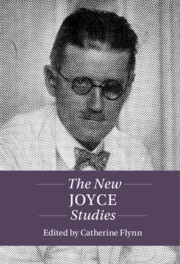Book contents
- The New Joyce Studies
- Twenty-First-Century Critical Revisions
- The New Joyce Studies
- Copyright page
- Contents
- Figures
- Notes on Contributors
- Acknowledgments
- Abbreviations
- Introduction
- Part I Scope
- Part II Fragment and Frame
- Part III Perspective
- Chapter 12 Joyce’s Nonhuman Ecologies
- Chapter 13 Joyce and the (Critical) Medical Humanities
- Chapter 14 The Epistemology of the Pantry A Queer Inventory of James Joyce’s “The Dead”
- Chapter 15 Revisiting the Early Reception of Finnegans Wake in 1939
- Chapter 16 Joyce and Critical Theory
- Bibliography
- Index
Chapter 12 - Joyce’s Nonhuman Ecologies
from Part III - Perspective
Published online by Cambridge University Press: 01 September 2022
- The New Joyce Studies
- Twenty-First-Century Critical Revisions
- The New Joyce Studies
- Copyright page
- Contents
- Figures
- Notes on Contributors
- Acknowledgments
- Abbreviations
- Introduction
- Part I Scope
- Part II Fragment and Frame
- Part III Perspective
- Chapter 12 Joyce’s Nonhuman Ecologies
- Chapter 13 Joyce and the (Critical) Medical Humanities
- Chapter 14 The Epistemology of the Pantry A Queer Inventory of James Joyce’s “The Dead”
- Chapter 15 Revisiting the Early Reception of Finnegans Wake in 1939
- Chapter 16 Joyce and Critical Theory
- Bibliography
- Index
Summary
This chapter focuses on James Joyce’s investments in life at the microscopic level in Ulysses and Finnegans Wake as a way of linking literature and science methodology with Grusin’s (2015) concept of a “nonhuman turn.” Ebury’s intervention is to turn an established critical conversation about Joyce’s knowledge of the nature of matter towards his aesthetic and ethical emphasis on nonhuman life, and consider how his interests in science facilitate an awareness of connectedness across different categories of being. Previous ecocritical scholarship on Joyce has mostly concerned itself with whole entities, from Joyce’s representation of rivers or trees to Joyce’s attitudes to specific species and biological principles. Ebury builds on Tim Clark’s (2015) “scale framing” approach to argue that Joyce’s use of the nonhuman microscopic scale, informed by the complexities of quantum physics, might help us to cope with the difficult equation of our responsibility to the nonhuman.
- Type
- Chapter
- Information
- The New Joyce Studies , pp. 193 - 207Publisher: Cambridge University PressPrint publication year: 2022



